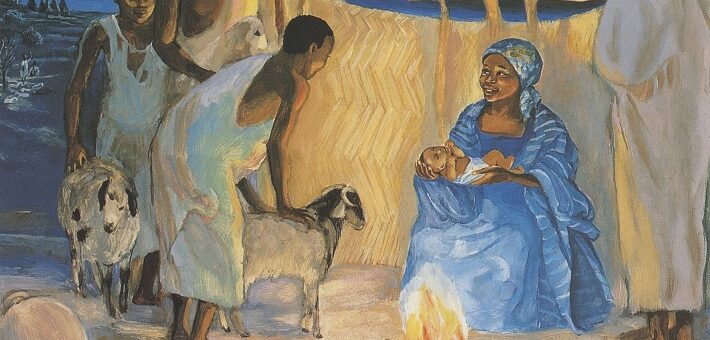Commentary on Isaiah 9:2-7
The propensity of too many preachers is to take a hop, skip, and jump over the challenges that underlie this text and go directly to the salvific reality of Jesus the Christ.
However, especially as all around us in society and in our US culture there are the chaos and destructive results of racism, sexism, violence, war, and poverty, to name a few, we need to spend a little time looking at the conditions that have made this ancient oracle words of hope and a promise of celebration for all time.
The territories of Zebulum and Naphtali (verse 1) had experienced the devastation of the advancing Assyrian army, the direct result of their decision to trust human allies rather than divine promises. The people had been betrayed by the idolatry of their ruling monarch, King Ahaz, which put them directly in the path of God’s anger, and divine retribution came at the hands of the Assyrian war machine. They were a people caught in the throes of destroyed lives and abject suffering, and in great need of a word of hope.
The opening lines of the text juxtapose their present reality of pain and anguish with a future hope of joy and celebration. It is a proclamation that speaks of a reversal of fortune that is of divine origin. Shining light will dispel the deep darkness that has overshadowed the land; a decimated people will see their generations increase; the weight of oppression that they have been carrying will be lifted permanently, and all signs of the death caused by invading armies will disappear. In its place will be new birth; new opportunity for fullness of life, the penultimate monarch with the purity of a child shall lead the people in the ways of peace and justice.
It is timely and welcome news to a beleaguered people and the prophet offers it in the assurance that the God who has again and again saved God’s chosen ones will do so again. He offers this assurance despite the fact that again and again the self same chosen people have walked away from God and betrayed the divine covenant. Poetic language aptly describes the authority, peace, and justice that is attributed to the rule of the Davidic monarch, as well as the exigencies that it has evidenced over time. Righteousness is linked to the one named as the bringer of peace, a quality sorely lacking in society and the lives of the people then and now. It is the much-needed salvation that the people have longed for and its assurance is founded on a reliable source: “The zeal of the Lord of hosts will do this.”
Isaiah, who has previously warned the Israelite monarchy of the dangers of trusting in earthly kings for their protection and provision, reminds the people of Judah that only by looking to the divine, the God of their ancestors, can the people be guaranteed the salvation they need to have the fullness of life for which they yearn. And it is the same guarantee upon which the lives of God’s people in this present age is based. The situation of Christians and the need for assurance is the same in this time as it was when the prophet Isaiah spoke these words.
The invading army that has overrun the people of God, that has brought destruction and despair, has come in the form of racism and segregation; poverty and homelessness; unemployment and violence; and the myriad ills of society that are fueled by greed and humanity’s commitment to seeking their own gain and indulging in their own pleasures at the expense of others and the environment. Even the celebration of Christmas and its connection with the birth of the Christ child has spawned ever-increasing ways of advancing human greed and exploitation of the weak by the strong.
The reality that confronts the preacher in this season of light is that the darkness of the world’s ills is all around us. Nevertheless the text directs the preacher to claim again the hope that emanates from the light of the world that shines in every time and place. Isaiah’s oracle of divine grace speaks of freedom from every form of bondage and is the epitome of good news to suffering humanity in every age and to every tribe and nation. While the text does not refer to Jesus as the source of this good news, as Christians we grab hold of the promise of Isaiah’s prophecy and claim its benefit as our own.
The child whose birth we will celebrate in a few hours is of divine nature and comes among us with the gift of grace that is a guarantee of justice for the downtrodden. Through his birth the marginalized claim their rightful place in the household of God and all are free to live lives of wholeness. At a time when the evidence of the hegemony of the world’s systems seems to deny the humanity of the poor, the text reminds us of the assurance of grace that is part and parcel of God’s sovereignty. It reminds us of the salvation that has become the right of each person born in the image of God. The message of this text that the preacher can offer with integrity is good news that speaks of God’s active, transformative presence in both individual and corporate lives.
God has established a salvific presence among fallen, sinful, oppressed humanity that transcends time. The prophecy of Isaiah has been fulfilled in Jesus Christ, but the message of hope is still needed in this and every age of human existence. The familiarity of the text yet offers an opportunity to make new the message of redemption and release that has come with the birth of Christ. The prophecy fulfilled in the birth of Jesus, is still awaiting total acceptance by all people, and we need to hear it as we work to bring to fruition the kingdom of God on earth.


December 24, 2015